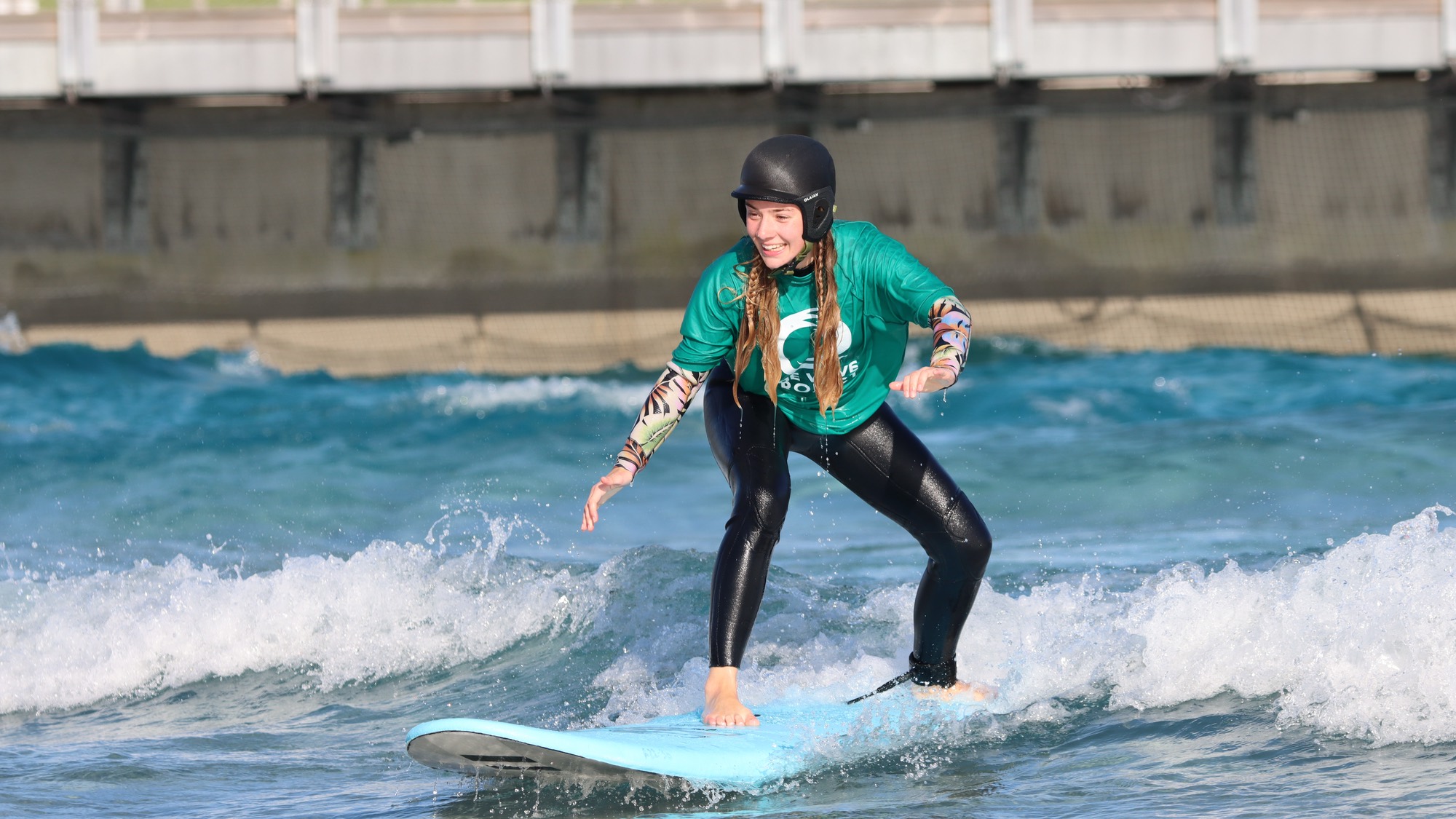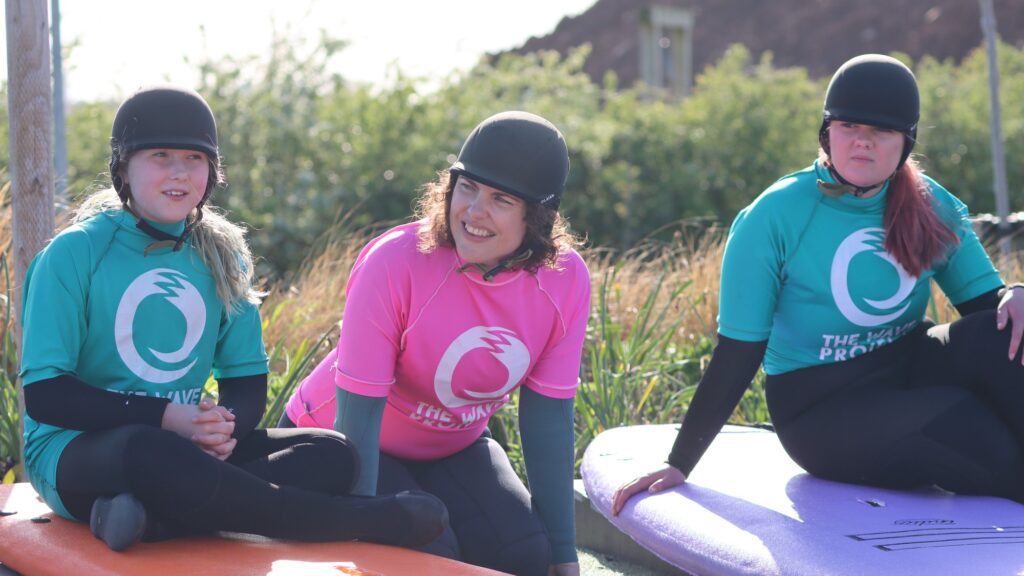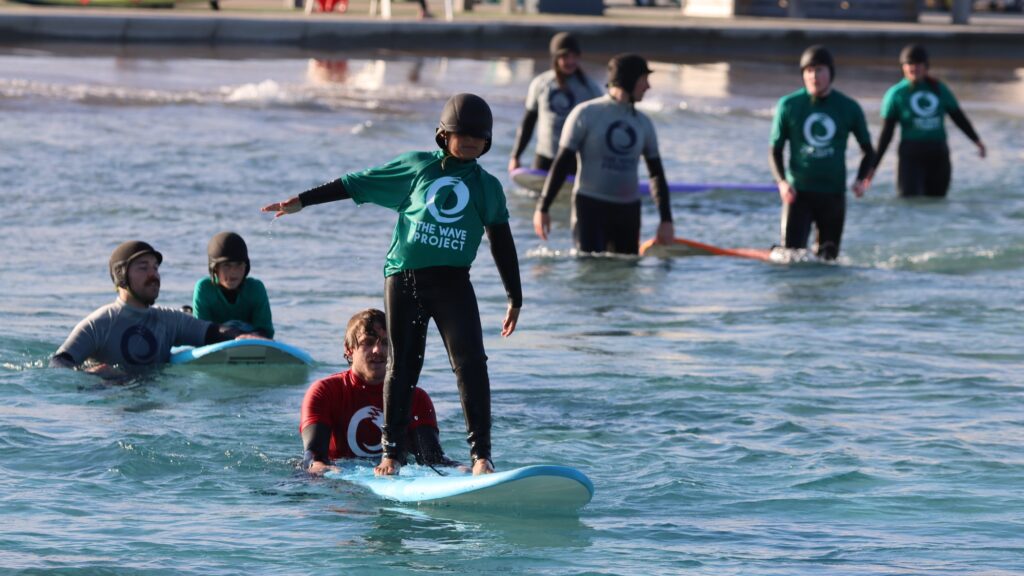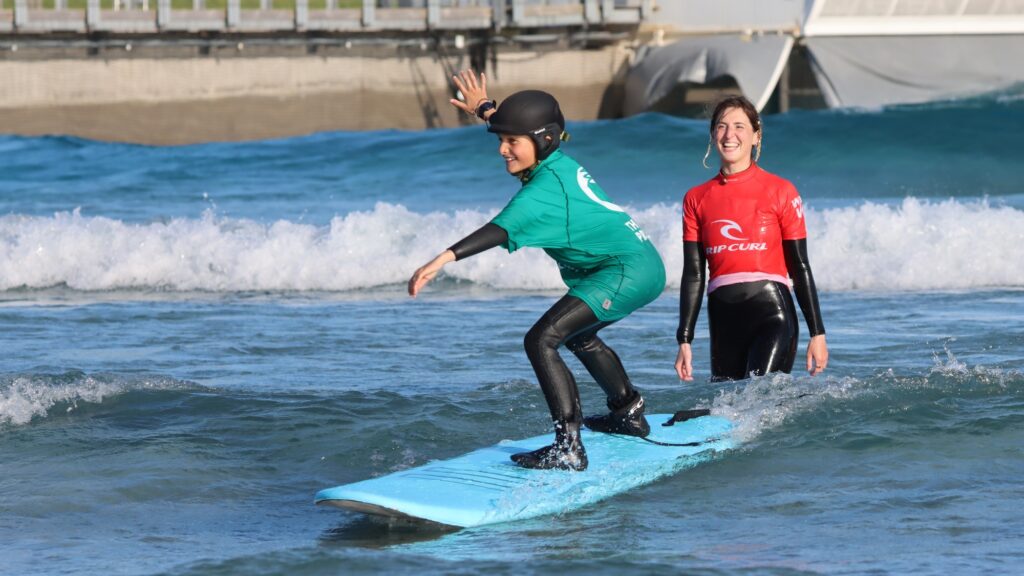Group uses wave pool to enhance the mental and physical health of young people

It’s no secret: The impact of the ocean and surfing can have astoundingly positive effects on people’s lives. But can the same be said about surfing in a wave pool?
For years the Wave Project in Bristol, England has been specifically utilizing a wave pool to enhance the mental and physical health of young people in need. We sat down with Tim Trythall, the program’s project coordinator, to understand exactly how they are leveraging The Wave in Bristol to harness the power of riding waves. From their unique approach that combines people with various challenges, the overwhelmingly positive effects they’ve experienced, and success stories, Tim gave us the low down on their life-changing programs.
Can you, in a nutshell, tell me about your work here in Bristol?
The Wave Project is a surf therapy intervention. We take young people who are aged 8 to 21 who might be struggling with their mental health or challenged in various ways – whether they are autistic or have neurodevelopmental delay problems, whether they experienced some trauma. We’re aimed at improving confidence and trust. How we do that is through this six-week course where we organize for the young people and their families to come along and get in the water. A big part of what we do is we provide 1 to 1 mentorship with our trained volunteers. That’s a big, big part of what we do. It’s about having as much fun as possible in the water and trying to create that kind of space where they might feel different from their normal life and provide a bit of a scene change and confidence
Can you run through a list of what symptoms, what situations, you treat with this program?
Mental health, depression, and anxiety are often common denominators, but that can be attached to various challenges. So the root causes we find ourselves working with are a lot of young people with autism, a lot of young people who have grown up with trauma, a lot of young people who might be working from more deprived areas of Bristol, and a lot of adaptive needs as well. We have a policy where we don’t focus on one particular group. We like that it’s a mixed group and we found a lot of benefits to having a mixed group, especially when we’re talking about trust and confidence. That’s working really well for us.

What do you find that surfing provides for the participants?
The best way we found of easily describing it is almost that the water provides a sensory overload. And there’s this space where they don’t necessarily have the brain space to think about other things and they’re actually forcefully, almost put into a mindful state by the act of being in the water and being overwhelmed in a positive way by what’s going on. Also, surfing is a vehicle for providing that sense of achievement, a sense of being a bit more robust in a new skill, and that progresses. Lastly, the positive adult relationship with the mentor is a really big part of what we do. Combining those three is how we describe our theory of change.
Can you give me an example of someone who’s benefited?
There are so many stories. In the course what’s happening right now we have a young boy who has ADHD, for example. He also has a mild form of Tourette’s and tics that go along with ADHD now. How he responds to surfing has been amazing. I was chatting to his mum last week and she’s actually noticed a massive drop in the amount of ticks before and after a session, even after two weeks. He’s coming from a school where he’s being asked to go home because they can’t handle his behavior and he’s coming to our session and he’s leaving in a mood that Mum is not used to because it’s so calm and so positive. Little anecdotes like that, even at week three, are amazing. There are loads of stories that go along with every course and it’s easy to get too focused on the kind of dramatic changes. But actually, it’s really nice to zone in on some of the really small changes that might fly under the radar but mean a lot to the family.
Water provides a sensory overload. And there’s this space where they don’t necessarily have the brain space to think about other things and they’re actually forcefully, almost put into a mindful state by the act of being in the water and being overwhelmed in a positive way.
Tim Trythall
It sounds like it makes his quality of life better.
Yeah. And a big part of what we do is providing the six weeks they’re allowed to come back to the surf club, but we really want to see long-term sustainable impact on the young person’s life and hearing about how it’s diffusing out into their day-to-day life, not just in the water.
After your six-week program, how often do they return? Do they come once a week, twice a week?
It depends on capacity and what we can offer. We have a surf club that I put on every other week during delivery periods and the family can book sessions. It’s a little bit more sporadic. They don’t necessarily have that 1-to-1 mentorship. They may have different mentors each week, so it requires a little bit more confidence. But we hope by that point they’re ready for that and they can keep coming for as long as they want over the years. We’ve got lovely examples. Last year when I was working elsewhere, we had a young person who was a surf therapy student, come along to a course. He then became a young mentor and then he became a fully-fledged over 18 adult mentor. He ended up working in the local surf community. To see someone go through that whole journey is amazing.

There have been programs for people with autism, programs for disabled veterans, and people with PTSD – yours seems to cover a lot. Is it the first program that you know of that has more of a blanket approach than a specific one?
I wouldn’t want to say it’s the first. As the Wave Project, we’ve been around for ten years and we definitely are the pioneers of surf therapy. There’s Wave For Change in South Africa which is also a really big organization. They have certain types of groups they focus on and then the rest, as you say, often have a specific kind of group they’re looking at. I think we are unique in the sense that we do mix the group, which presents its own challenges, trying to support various needs at the same time. But also, that’s something we keep reflecting on, and seeing the benefits of young people who may not usually find themselves in that social group actually having that kind of cross-link, is lovely.
For someone reading this article who wants to help, how can they get involved?
There are loads of ways. One of the big ways you can help is by becoming a volunteer. They’re amazing. Our volunteers give up their time to be trained and be there every week. Outside of that, you can help fundraise. We are still a grassroots charity. We rely on a lot of community fundraising to get the courses going. I have one volunteer who’s willing to make a film with us and help spread the word in Bristol.
Is there anything you’d like to add that maybe we missed in our conversation?
As someone who’s grown up around the sea and the natural environment and has worked with surf therapy in the ocean environment and the blue space of a wave pool, I think it’s a conversation where people like to judge the benefits, or the potential benefits, of working in an artificial space somewhat. I just like to talk about how amazed and inspired I am about how well blue spaces like this work to provide that therapeutic environment.

Related Coverage
